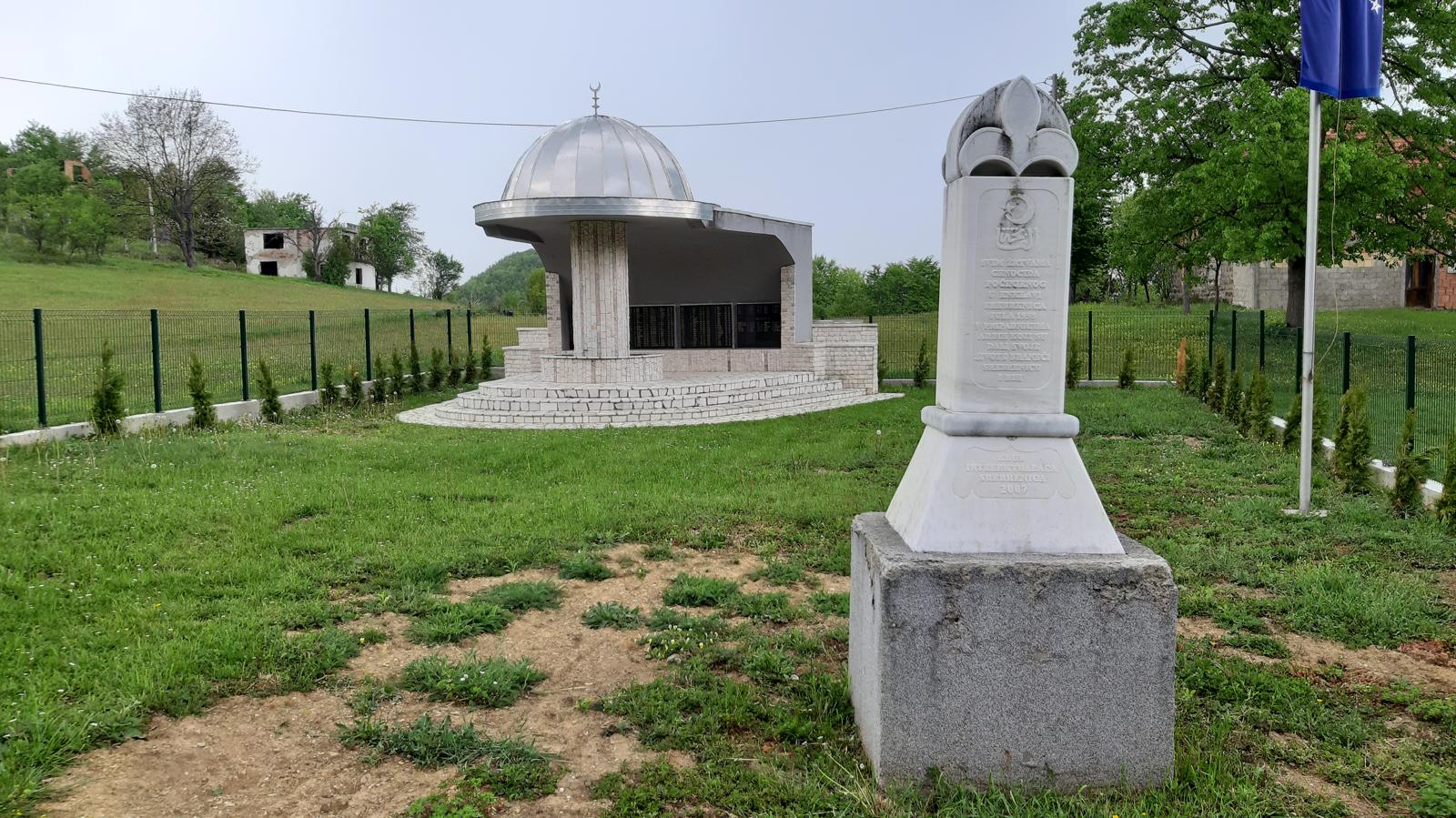Paradoxically, Germany’s key role in initiating the UN resolution, condemning any form of denial of the genocide and the glorification of those convicted of serious war crimes – both of which are continuously happening in Serbia – is counteracted by leading German politicians who are cosying up to Serbia’s President. One of them is Bavaria’s Prime Minister Markus Söder who visited Belgrade in March, pompously calling Vučić his ‘friend’ – wilfully blind to the role the latter had played during the Milošević regime: between 1998 and 2000, Vučić was Minister of Information, not only responsible for the crack-down on the independent media, but also for the propaganda legitimising the atrocities carried out by Serbian forces against the Albanian population during the Kosovo war (1998-1999). Prior to that, on 20 July 1995, while the killings in Srebrenica were still ongoing, Vučić as an MP for the far-right SRS or Radical Party, declared in parliament: “For every Serb killed, we will kill 100 Muslims“.
It is with such a dubious figure that Söder seeks friendly relations (as other CSU politicians in the past did with Viktor Orbán and Vladimir Putin). Under Aleksandar Vučić, Serbia has drifted towards authoritarianism, restricting the freedom of speech like few other countries in Europe: Serbia ranks 98 on the World Press Freedom Index, far lower than Hungary for example. And what’s worse, Bavarian government ministers do not seem to be averse from adopting similar policies: to criminalise protests and curb the freedom of speech as they see fit. I am thinking here of the responses to (Last Generation) environmental protests a while ago, and more recently, the so-called fight against ‘antisemitism’, which has turned into a stick with which the Bavarian government hits left-leaning activism. There is a hardening of positions at Bavarian universities (and not only there) to criminalise ‘pro-Palestinian’ protests labelling them as ‘antisemitic’, even if some universities in Bavaria (such as LMU München and FAU Nürnberg-Erlangen) have tolerated protests and camps.
Recently, before the start of the current Winter Term, the Bavarian State Ministry of Science and the Arts announced a new Bavarian Action Plan against Antisemitism, which involves coordinated action between Bavaria’s higher education institutions, the police, the judiciary, and die Politik (presumably Bavaria’s CSU-led government) threatening students potentially with deregistration from their university in case they are deemed responsible for antisemitic incidents. The plan includes the appointment of antisemitism commissioners at all Bavarian universities (a measure that according to the press release has been implemented already), and the inclusion of legal sanctions against students like forced expulsion from university, in the Bavarian Higher Education Innovation Act. Minister Blume announced zero tolerance towards forms of antisemitism and hostility towards Israel. Of course, we will have to wait and see how stringently the Bavarian authorities will implement these policies. As the recent official prohibition of ‘gendered’ language at universities in Bavaria has shown, many simply ignore the ban, and it is not policed either.
In the case of antisemitism, the official response is likely to be not so indifferent. The main problem, though, is that the authorities define antisemitism in a rather broad manner. This means that one can never be sure how these policies will be implemented. It may lead to legal uncertainty: the potential and probability of conceptual overstretching will go together with unpredictability and arbitrariness of government action, sowing fear amongst students, which indeed may be the intended effect. Is this what is lying ahead of us now in Bavaria?
So, it is worth asking, what constitutes antisemitism? Is any form of criticism of Israel, or criticism of what its armed forces do in Gaza antisemitic? Is denouncing the racism of far-right ministers in the Israeli government (like Itamar Ben-Gvir or Bezalel Smotrich) a form of antisemitism? Is the use of the term ‘Apartheid’ for Israel’s policies in Palestinian-inhabited territories, by Amnesty International, Human Rights Watch, and the Israeli human rights organisation B’Tselem an antisemitic slur too? Can South Africa’s genocide case against Israel at the International Court of Justice be dismissed as ‘antisemitism’, as has happened with the International Criminal Court arrest warrants over alleged war crimes for Benjamin Netanyahu and Yoav Gallant, the Minister of Defence of Israel?
At Bavarian universities, there is little debate on this, with perhaps a few exceptions, such as a lectures series organised by the Centre Human Rights Erlangen-Nürnberg (CHREN), or an upcoming talk by Jacob Eder (Barenboim-Said Akademie, Berlin) at the History Department of the FAU Nürnberg-Erlangen. At other universities, it is a taboo theme: students as well as academics are afraid to express themselves, since in the last twelve months or so – after the horrendous attacks led by Hamas on 7 October last year – quite a few individuals who were openly critical of Israel’s heavy-handed response, including Jewish intellectuals and artists (such as Nancy Fraser, Judith Butler, Masha Gessen, and Candice Breitz) were disinvited by German higher education and art institutions. In October 2023, more than one hundred Jewish intellectuals living in Germany published an open letter, protesting against the conflation of antisemitism and criticism of the state of Israel. Despite a handful of positive and negative responses (including accusations of antisemitism), it was largely ignored.
For me, it is surprising to see that some Germans have no qualms whatsoever accusing critical Jewish intellectuals of ‘antisemitism’. This ease and self-righteousness with which this judgement is cast I find breathtaking and Kafkaesque. I only started to understand this reality after reading the book Desintegriert euch! (2018) by the Jewish-German writer Max Czollek. He speaks of a Gedächtnistheater or ‘remembrance theatre’, in which Jews are expected to play a specific role in the Wiedergutwerdung (the ‘becoming-good-again’) of the Germans. In case independent Jewish voices do not meet these German expectations, they are ignored. A diversity of opinions is not accepted: when Jewish citizens refuse to play their prescribed part, they even run the risk of being labelled antisemites, which is the flipside of Germany’s philosemitism and its unconditional support for Israel.
The key question is whether criticism of Israel, or hostility towards the state of Israel, is by default ‘antisemitic’, as the International Holocaust Remembrance Alliance (IHRA) definition of antisemitism seems to suggest. The IHRA working definition of antisemitism (2016) has been widely adopted but also fundamentally criticised for its conceptual vagueness, posing a threat to academic freedom. Developed as a tool to help monitor antisemitism, it is – as many antisemitism and legal experts have indicated – prone to political instrumentalization, which is indeed happening now in Bavaria and in Germany more broadly. Numerous leading scholars, including the majority of Holocaust and antisemitism researchers, are critical of the IHRA definition, proposing the alternative Jerusalem Declaration on Antisemitism (2021) — it was signed by around 350 scholars, amongst them well-known scholars and experts in the field such as Aleida Assman, Omer Bartov, Natalie Zemon Davis, Carlo Ginzburg, Marianne Hirsch, and Jay Winter.
I am concerned by the lack of debate on this important issue, which should happen before the Bavarian Action Plan against Antisemitism is implemented. The danger is that the fight against antisemitism becomes a governance instrument to quell criticism and debate on an issue that is extremely divisive in German society, as five and a half million Muslims living in Germany feel they are ‘stigmatised’ and ‘profiled’ as real or latent antisemites, which – while putting oil on the fire of the growing islamophobia in society – represents a convergence with AfD positions. Germany’s political and cultural elites seem to be indifferent to the suffering of Palestinians and the threats affecting Muslims in Germany, as if their lives are less valuable and perfectly dispensable for the sake of Israel’s security. As Max Czollek writes, Germany can only perceive itself as being ‘in partnership with the Jews’, that is, with one specific type of Jewish political subject – embodied by the Central Council of Jews in Germany – claiming it represents all Jews.
It is worrying to see that with the rise of the AfD, racism and islamophobia are becoming normalised in Germany – Jewish lives need protecting whereas the risks to the lives of other migrants are not worth mentioning. It is this latter group that might be targeted if the situation in Germany turns nastier with the AfD gaining power. As we now know, since the publication of a report by investigative journalists, the AfD wants to deport all foreigners, including those with a German passport. The slogan ‘Millionenfach abschieben’ (‘Deport by the millions’) is now openly chanted or printed on banners at AfD election parties, which is an ominous sign that more violence against migrants and asylum seekers may be in the air, after an already long series of arson attacks, pogroms, targeted murders, bomb attacks and shooting sprees, starting with the arson attack in Duisburg in 1984 (with 7 migrants killed), followed by many others such as the NSU series of murders between 2000 and 2007 (10 people killed), and most recently Hanau 2020 (with 9 people killed). In many cases, bystanders cheered, the authorities looked the other way, and police failed to act, blaming the attacks on immigrants as in the case of the NSU series of killings. The families of the NSU victims have accused Bavarian police of racism during the investigation.

